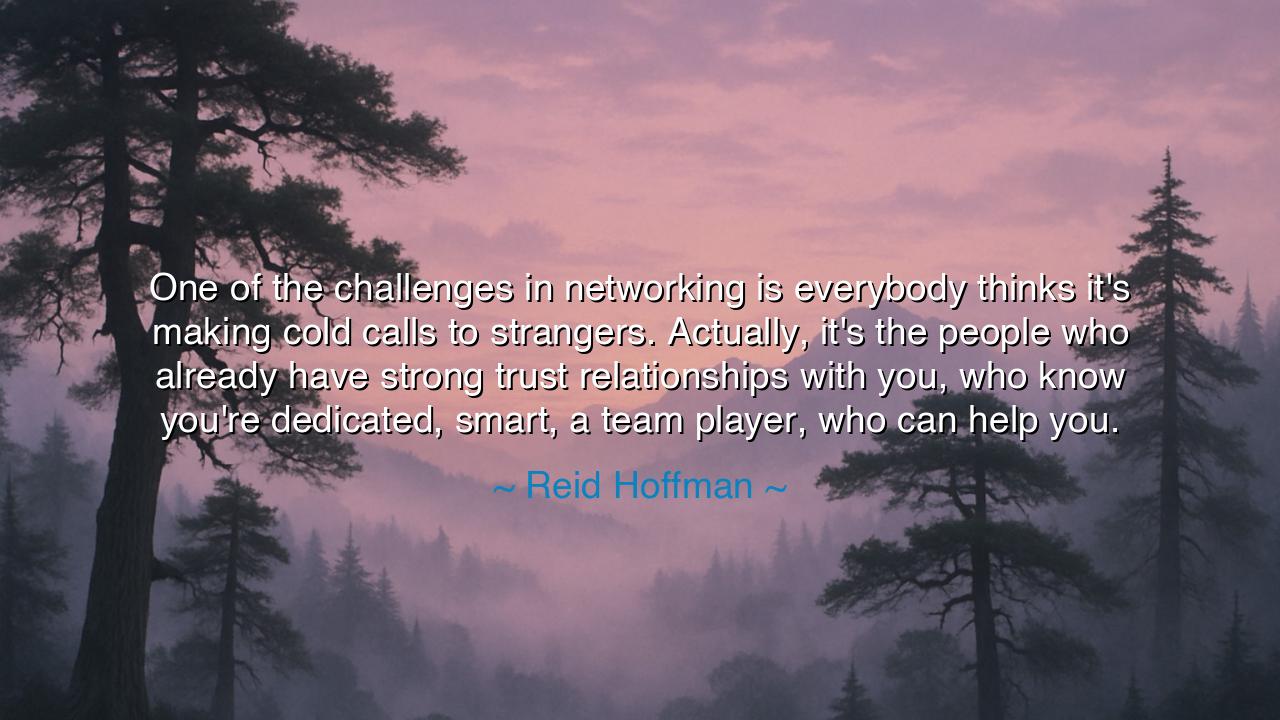
One of the challenges in networking is everybody thinks it's
One of the challenges in networking is everybody thinks it's making cold calls to strangers. Actually, it's the people who already have strong trust relationships with you, who know you're dedicated, smart, a team player, who can help you.






Opening Scene – Narrated by Host
The room was quiet, filled only with the gentle sounds of the outside world. Jack sat at his desk, thoughtfully reading a quote that had made him pause. It was from Reid Hoffman, and it challenged a common misconception about networking. The words struck Jack because they emphasized the importance of trust and relationships in building connections, something often overlooked in the rush to make new contacts.
Jeeny walked into the room, sensing Jack’s focus. She sat down across from him, intrigued by his expression.
Jeeny: “You seem deep in thought. What’s on your mind?”
Jack looked up, still absorbed by the quote, and shared it with her.
Jack: “I was thinking about something Reid Hoffman said: ‘One of the challenges in networking is everybody thinks it's making cold calls to strangers. Actually, it's the people who already have strong trust relationships with you, who know you're dedicated, smart, a team player, who can help you.’ It made me think about how often we overcomplicate networking. We focus so much on making new connections, but the real value comes from the relationships we’ve already built. It’s those people who know us and trust us that can help open doors.”
Jeeny nodded, considering the depth of Hoffman’s perspective.
Jeeny: “That’s such an interesting take. It’s easy to think that networking is all about reaching out to strangers, trying to make connections out of the blue. But what Hoffman is saying is that the real power of networking comes from the people who already know us. They’re the ones who can vouch for our character, who understand what we bring to the table, and they’re the ones who can open opportunities for us. It’s not about cold calling—it’s about building trust over time.”
Jack: “Exactly. It’s all about the quality of relationships, not just the number of connections. We often forget that trust takes time to build, and the people who already know us—whether through work, personal connections, or shared experiences—are the ones who have the most influence in helping us move forward. They can advocate for us in ways that strangers can’t.”
Host: Their conversation deepened as Jack and Jeeny explored the real meaning behind networking. Hoffman’s words weren’t just about professional connections—they were a reminder that the foundation of any meaningful network is trust. While reaching out to new people is important, the people who already have a strong connection with you are often the best sources of support and opportunity.
Jeeny: “It’s like saying that building trust is the real currency of networking. The people who already know that you’re reliable, dedicated, and hardworking are the ones who will help you the most. They’ve seen your work, they know what you’re capable of, and that’s the real power of a network—it’s not just about who you know, but about who knows you.”
Jack: “Right, and that’s why it’s so important to nurture the relationships we already have. Networking shouldn’t just be about chasing new connections—it’s about maintaining and strengthening the ones we’ve built over time. The trust and mutual respect we’ve developed with these people are the foundation for future opportunities.”
Jeeny: “Exactly. And it also makes networking less intimidating. It’s not this big, overwhelming task of trying to talk to a bunch of strangers. It’s about deepening the relationships with the people we already know and showing them that we’re dedicated and dependable. Those are the people who will help us when we need it.”
Host: Jack smiled, feeling the clarity of their conversation settle in. Hoffman’s words weren’t just about redefining networking—they were a reminder that the real value of relationships lies in trust. Building a strong network isn’t about cold calls or random connections; it’s about investing in the relationships you already have and nurturing the trust that allows those connections to flourish.
Jack: “So, maybe the lesson here is that networking doesn’t have to be this daunting task of making cold calls. It’s about deepening the trust with the people we already know and showing them that we’re reliable, smart, and dedicated. Those are the people who can really help us when we need it.”
Jeeny: “Exactly. It’s all about building a strong foundation of trust, and from there, opportunities will naturally follow. The people who already know us best are the ones who will help us most.”
Climax and Reconciliation
The room felt lighter now, as Jack and Jeeny reflected on the deeper meaning behind Hoffman’s words. Outside, the world continued its steady rhythm, but inside, they had uncovered something profound: true networking isn’t about the number of strangers you meet—it’s about the trust you build with the people who already know you. By nurturing those relationships, we create a network that’s strong, supportive, and filled with opportunities.
Jack: “So, maybe the key is to stop chasing after endless connections and focus on the quality of the ones we already have. Trust and mutual respect are what make a network powerful, not just how many people are in it.”
Jeeny: “Exactly. When we build trust, the right opportunities will naturally follow, and the people who know us best will be the ones who help open those doors.”
Host: The conversation settled into a quiet understanding. Networking isn’t about making cold calls or chasing after new connections—it’s about investing in the relationships we already have, nurturing trust, and allowing those connections to flourish into meaningful opportunities. By building a network based on trust, we create a foundation that supports us, both professionally and personally.






AAdministratorAdministrator
Welcome, honored guests. Please leave a comment, we will respond soon